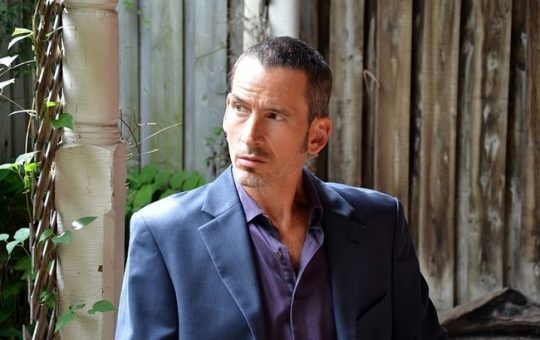.
On ‘stress leave’ from the Afghanistan, Canadian soldier Elias Triffanis has recently arrived on the politically-divided island of Cyprus. In this opening scene, a doctor interviews Elias about the troubling after effects of a recent combat mission that went horribly wrong. Elias’s troubles, however, are just beginning. —Richard Farrell
§
PAPHOS, CYPRUS, 26 OCTOBER
“How long is it, then, since you have slept?” the doctor asked.
Elias looked up at the ceiling, trying to recall. The blades of the fan turned listlessly—in fact, they seemed to be slowing, as if the power had just cut out again.
“Surely you’ve slept a little since we last met?”
“It was yesterday, right?”
“Yesterday morning.”
“Okay.”
“About thirty hours ago,” the doctor said.
“I’ve passed out a couple of times, for a while. I tried not to.”
“So, you did not remain asleep? You had the dream again?”
“Yes.”
“You wish to describe it again, or the incident itself?”
“They’re almost the same. It’s not really a dream. More like a video of an atrocity.”
“As I said, this is typical of your condition—diagnostic, actually. However—”
“And, no, I don’t.”
“Pardon me?”
“Want to describe it again.”
Drops of sweat glistened on the raw-looking scalp under the doctor’s blond comb-over. Thick glasses magnified his colourless, pink-rimmed eyes, which blinked often. “Avoiding sleep, however,” he said. “It’s understandable, but I fear that such a—such a practice can only make the matter worse.”
“I’ve never needed much sleep.”
“Men of your kind often boast of how little sleep they need.”
“You’re not meant to mock your patients, are you?”
“You do look tired,” the doctor said, as if he hadn’t heard, “though in fact you seem somewhat improved today. Still, I apologize—”
“Frankly, I don’t feel that bad, I feel relieved, because I’m awake now, not asleep and reliving things. Insomnia is a fucking joy in comparison to that.”
“Self-inflicted sleep deprivation—not insomnia.”
“What did you mean by men of my kind?”
“Why do you ask?”
“Because I have no idea myself anymore.”
“Large men, robust. Metamorphic. Pardon me, mesomorphic.”
Elias Trifannis looked out the window over the doctor’s shoulder: a white pebble beach, the calm Mediterranean pixelated with sunlight. The army was using this former student residence on the west coast of Cyprus to treat personnel on stress leave from the war. Last night, while Elias silently performed yet another set of push-ups on the cold cement floor of his room, trying to hold off sleep, the patient in the next room screamed catastrophically. That was helpful: a few extra hours of adrenalized alertness.
“It’s funny how people think they can look at your body and know your soul,” Elias said.
That magnified blinking again. In a faster, fainter voice the doctor said, “Ah, mais oui, you are quite right, one should never assume a correlation between, between . . . how could I put it . . .”
Elias yawned helplessly, gapingly, a pathological yawn that convulsed his whole body. “Sorry, Dr. Boudreau,” he said at last. “I really do enjoy talking to you.”
“Perhaps you will be able to sleep better on your weekend away? I hope so. You are going across the island, to visit family?”
“Distant relatives.”
“How is your Greek now?”
“Etsi ki etsi. If you don’t mind my saying, you look really tired yourself.”
“Yes.” The doctor’s blinking made it seem he was trying to communicate something in a sort of binary code, words he couldn’t bring himself to say. “It’s not simply this heat wave. Normally, one grows used to working with the—the traumatized, yet I seem to find it increasingly . . . But what am I saying? I must not say such things!”
The fan still gave the illusion of perpetually slowing without ever stopping.
“In any case, Master Corporal—I wish you a peaceful weekend.”
“Don’t call me that, okay?”
“And, please, don’t speak of what happened in Kandahar.”
“I wouldn’t know how to speak about it.”
“And bear in mind, it was not your fault! Not anyone’s fault!”
The doctor subdued his twitching by closing his eyes for a second, then opening them wide. “It was simply . . .”
“An accident. I know.”
“And don’t forget your medication.”
“No way. I love my medication.”
Dizzy, seeing double, Elias tried to focus his gaze. Out the window in the distance a sunburned figure in a swimsuit—who seemed impossibly to be the doctor—appeared on the shore and walked into the sea.
— Steven Heighton
Excerpted from The Nightingale Won’t Let You Sleep by Steven Heighton. Copyright © 2017 by Steven Heighton. Published by Hamish Hamilton Canada, a division of Penguin Random House Canada Limited. Reproduced by arrangement with the Publisher. All rights reserved.
N5
Steven Heighton is the author of fourteen books, including three short story collections, three novels and six poetry collections, including he Waking Comes Late (2016), The Dead Are More Visible (2012), Every Lost Country (2010), and Afterlands (2005)
N5

